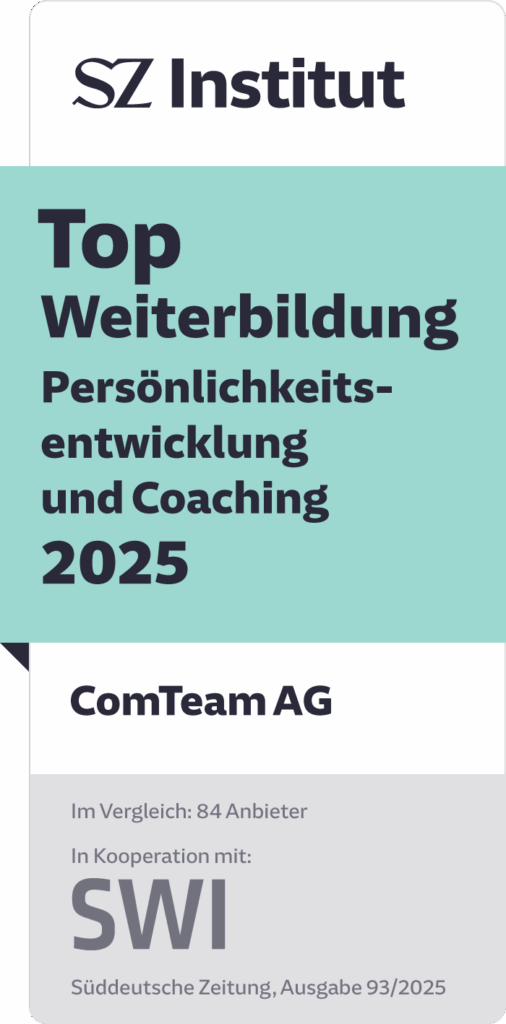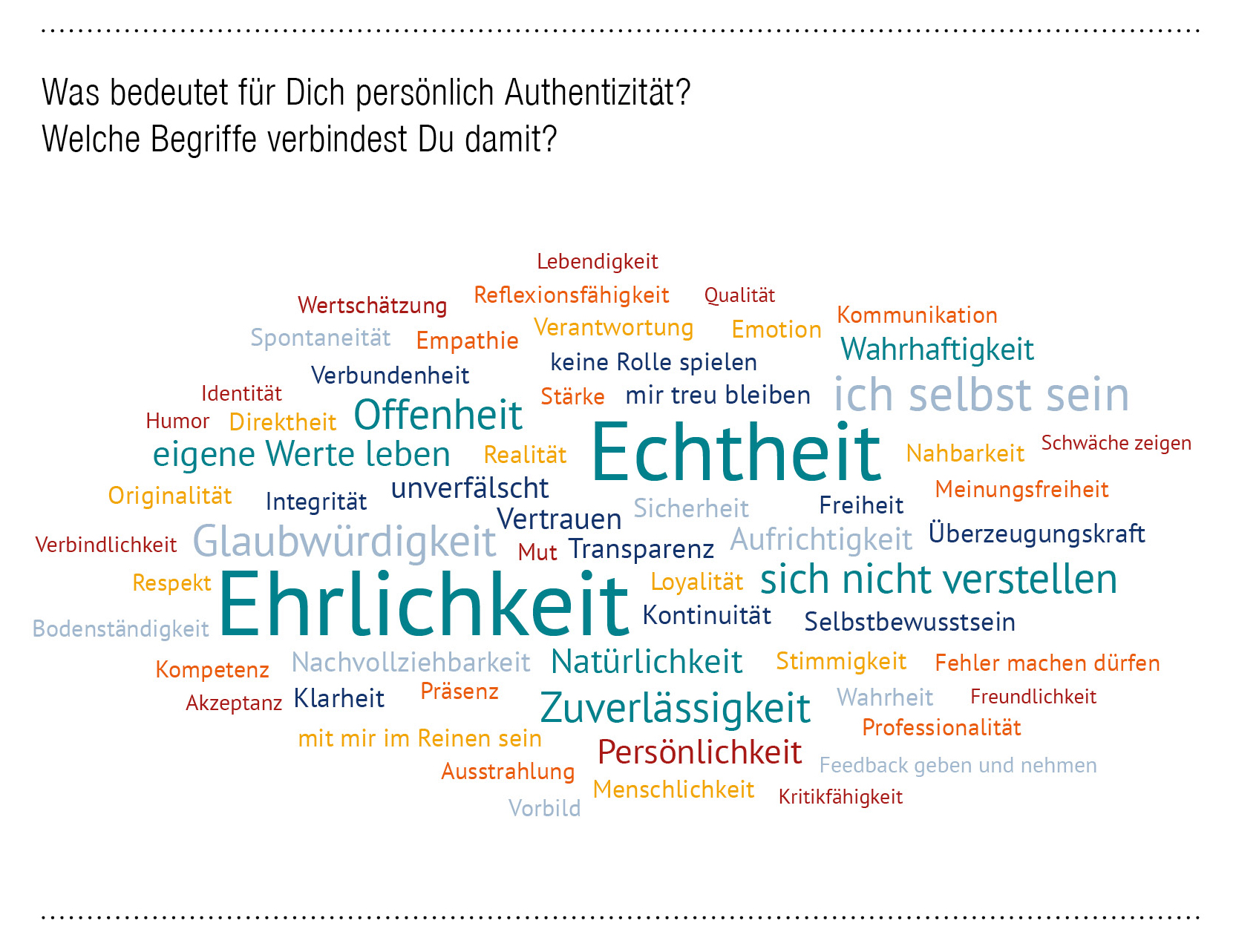That is your focus ...
Your are searching for ...
Excellent

Ausgezeichnet

Our fields of expertise
Discover
ComTeam AG | Academy + Consulting
Bergfeldstraße 11
83607 Holzkirchen, Germany


ComTeam AG | Academy + Consulting
Bergfeldstraße 11
83607 Holzkirchen, Germany
Authenticity means being genuine, honest, and true to yourself. In the world of work, authenticity is a key success factor – and it seems that the accelerated digitalisation of our meeting culture has opened the window of visibility even wider: Children and pets are increasingly part of meetings in video calls and, with working from home, our colleagues are more and more invited to our homes via the screen. This means we are revealing more about ourselves than we used to.
How does this change affect our professional behaviour? Perhaps even our corporate culture? How genuine or authentic can, want and are we allowed to be at work? What role does authentic behaviour play for employees and managers – also in the context of the dissolution of boundaries, virtualisation of the working world and New Work?
Please not that our study report and study graphics are available exclusively in German.
„In future, the office will no longer only fulfil the function of completing orders on site. Instead, it will become a place for meetings, dialogue, and joint decision-making.“
Dr. Daniel Putz, Head of study
The ComTeamGroup’s authenticity study places authenticity in the context of the dissolution of boundaries, commitment, and the corporate culture in the respondents‘ organisations:

Companies would do well to understand authentic behaviour as a tangible competitive advantage that strengthens employee commitment, loyalty, and work-life balance. When it comes to promoting authenticity, the visible aspects of spatial and temporal delimitation and attractive workplace design play a much less important role than the establishment of an open and credible management and corporate culture. If differing opinions are valued, differences are accepted and employees feel safe, they will find it easier to make mistakes from time to time and overcome barriers to thought.
Employees value freedom in terms of time and space to do their job. What they don’t appreciate is being left alone. Wherever working hours and locations can vary greatly, the fluid transfer of information and functioning decision-making processes are therefore particularly important. Only if they are explicitly designed and their continuity is guaranteed can employees experience the real benefits of flexible working and identify with the organisation in the long term.
Although social distancing promotes commitment and engagement, it also increases work-life conflicts due to greater external influence. If employees are permanently taken over by others, engagement, commitment, and work-life balance are permanently disrupted. Managers should therefore not dismiss employees‘ efforts to distance themselves from others as reclusive behaviour, but instead recognise that this can be based on a responsible approach to their own resources and boundaries. Especially when working from home, it is important to strengthen employees‘ autonomy by encouraging them to maintain private boundaries and decide for themselves how much they want to disclose.
Authentic leadership behaviour leads to greater authenticity among employees and significantly more commitment and engagement. It is therefore worth taking a close look here. Employees measure the credibility of their own manager primarily by how they behave in situations where things get heated. If, for example, managers ask for advice from people who disagree with them or stand by their employees without reservation even if they make a serious mistake, they are making a lasting investment in the trust of their employees and in their commitment and dedication.
Hier wirken sozusagen „Scherkräfte“ zwischen reduziertem Informations- und Entscheidungsfluss von den übergeordneten Vorgesetzten und erhöhtem Kommunikations- und Orientierungsbedarf der eigenen Mitarbeitenden. Dieses Dilemma mag zunächst im Verborgenen wirken, unter anderem aufgrund weniger greifbarer Aspekte dieser Entgrenzung als bei einer Transformation physischer Arbeitsplätze und -mittel und weniger eindeutiger Lösungsansätze.
Mit zunehmender Dauer entgrenzter Arbeit werden damit einhergehende Einschränkungen aber zunehmend gravierender. Führungskreise sollten sich daher regelmäßig hierarchieübergreifend dazu austauschen, was es für das mittlere Management und die Mitarbeitenden braucht, um Informations- und Entscheidungsprozesse wirksam aussteuern zu können und selbst in funktionierende Strukturen eingebunden zu sein.
There are „shear forces“ at work here, so to speak, between the reduced flow of information and decisions from higher-level superiors and the increased need for communication and guidance from their own employees. This dilemma may initially be hidden, partly due to less tangible aspects of this dissolution of boundaries than the transformation of physical workplaces and resources and less clear-cut solutions.
However, as the duration of remote working increases, the associated restrictions become increasingly serious. Management circles should therefore regularly discuss across hierarchies what middle management and employees need to be able to effectively control information and decision-making processes and to be integrated into functioning structures themselves.
Management who are used to being proactively informed by their employees and involved in the decisions that are relevant to them, have a special responsibility here. They are required to recognise the changed information conditions by increasingly approaching their employees and engaging in dialogue about work-related developments. Although this sometimes means a shift in the corporate culture, everyone involved could benefit in the long term from the increased flow of information and the shared experience of coping.

We have some ideas for you. Just call or write an email!
Eva Zebisch
Change Communication & Public Relations
ComTeam AG